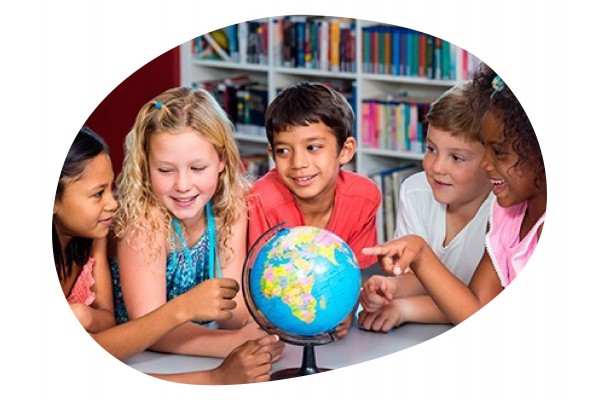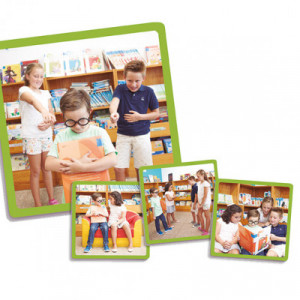Values education
Teaching and educating our children through values is fundamental for them to understand respect and give them the value they deserve certain behaviors, which will ultimately make them live better with all those around them, respecting both individuals who live with them and the environment around them, animals and plants that live in it.
Values are taught, by means of exemplary attitudes and they are learned by interiorizing experiences, own or lived by others.

Games to teach values
Values are sown in childhood and develop in the person as they grow. Educating in values allows to create a reflective attitude that favors the learning of a responsible autonomy, based on respect, empathy and self-control.
The values that a child should understand from an early age are friendship, tolerance, respect, solidarity, understanding, patience and all those that help him to live in full harmony with those around him.
In Akros we have developed products that show a wide variety of situations that invite reflection and allow us to create a critical attitude that makes education in values possible.
Children must learn to know the limits of their friends, siblings, parents, etc., so as not to overstep those limits or force others to do the same. We must teach them that these values are reciprocal, showing them that if you respect, you will be respected, just as if you share, others will share with you, etc.
It is very important that they learn the values, and we must instil them from a very early age, despite the difficulty, as children often take their toys off and do not \respect\" the playground turns, etc., but that is where we come in, parents and teachers, to help them differentiate what is right from what is wrong.
Positive reinforcement is often a great tool for understanding and assimilating the values we want to instill in our children, but above all, we must make them understand the negative consequences of their wrongdoings, so that they understand why they should not misbehave when they do so. Positive reinforcement when they do something good will help them see clearly the difference between good behavior and not-so-good behavior.
Education in values for children
Children are sponges whose learning will mold the adult they become. It is very important to offer fun learning tools that make them the best version of themselves. In addition, we adults are a mirror for them and we have to demonstrate through our behaviour what we want from them.
Teaching them to ask for things \"please\" and to \"thank\" when they receive them is just the beginning, but it is a good start. He teaches them to wait their turn, to respect him and to respect others.
Playing with other children with educational resources that also help them to understand and acquire certain knowledge of values will be a success that will lay the foundations of their education.
Games for the environment, learning emotional intelligence or acquiring a healthy diet will help them to develop in a happy way, so it is very important to integrate in their playful hours the greatest variety of games and activities that promote their development and learning.
Children need to play and develop their skills more and more. As we watch them grow, we see how the toys they have are falling behind and they are looking for new challenges, games and toys that will make them work harder. This is the symptom that we must look at to give them the most suitable material for learning values.
Akros develops high quality children's games focusing on the variety of children and personalities to meet their needs and enhance their strengths. Trust a family business for one of the most important things, your child's education.
Educating in values: preventing racism
Race is defined as a term, from the point of view of sociology, where belonging to a group is decided subjectively by people, from within the social system to which it belongs. The feeling of identity matures as the person grows. Children begin to acquire their web of convictions and sense of belonging to a group through the information they assimilate from the world around them. If children are prejudiced by this information, they incorporate it into their logic and lead their adult lives.
According to a report by the University of British Columbia (Canada), young people between the ages of 9 and 12 are more likely to be influenced and incorporate racist prejudices into their belief system. Once they enter puberty, racism becomes more evident. It is the age of categorization, and young people may show contempt for people of another race with preconceived and insulting ideas.
How to prevent racism in children
According to this research, preventing racism in adults is achieved through intervention in young people at the very time when racial stereotypes and prejudices begin to take shape within them.
The University of Vancouver study found that the age of reference, between the ages of 9 and 12, was likely to decrease their racist attitudes and thoughts when they received information about people of other races contributing to the smooth running of the community. The control group consisted of 369 Caucasian and Asian children between the ages of 5 and 12. The results concluded that it is possible to reduce racism among young people if they are given positive information about disadvantaged people in society.
Family education
The family is the unifying element in the education and maturation of the child. In addition to the interactions that are forged within it, also by how parents determine the kind of schooling their child will receive. The family will involve the child in its values, and these will be grasped by the child in creating its own autonomous beliefs.
The child incorporates elements of judgment into his or her learning as an infant. It is important for the child to understand that he or she must look at other humans with respect and retain his or her own identity and inner strength without feelings of inferiority that require enemies.
Children grow up as tolerant men when they experience these values in the society to which they belong. Until such a society materializes, the responsibility of adults is to direct the young towards the values of tolerance for others.
Parents need to be active in the face of prejudice and respond with complete sincerity to questions from their children. They are the child's point of reference on tolerance, and they should contribute to the intellectual and moral development of their children through hobbies, games and readings that encourage tolerance.
Tolerance is based on a correct self-knowledge of one's own identity. On that basis, other social groups can be appreciated, and the mechanism of prejudice can be understood to combat them.
Other educational values that we must instill
But racism is not the only scourge that we must avoid in the education of the youngest children: it is important to instil in them the importance of discipline through the application of rules of convenience, which aim to order the world in which they live, helping them to understand it better.
In this sense, in the Akros store you will find games adapted for children to internalize the use of good manners, both at school and at home or in their daily lives, positive attitudes to face life (in areas such as health, affection, cooperation...), ecology and empathy for animals, punctuality, conflict resolution....
In short, in our store you can find all the tools that will help you to educate your children in the best possible way, so that tomorrow they will be responsible, balanced and socially adapted adults to their environment.
"


































